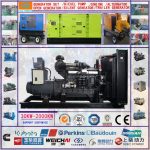Diesel Generator for Base Load Power A Comprehensive Guide

Introduction
In today's modern world, the demand for reliable and continuous power supply is more crucial than ever before. Industries, commercial establishments, and residential areas all require a stable source of electricity to function efficiently. One of the key technologies that help meet this demand is the diesel generator. In this article, we will delve into the details of diesel generators used for base load power, exploring their features, benefits, applications, and maintenance requirements.
Overview of Diesel Generators
Diesel generators are a type of backup power system that utilizes a diesel engine to generate electricity. These generators are commonly used in situations where a stable power supply is critical, such as in hospitals, data centers, manufacturing plants, and remote locations where the grid power is unreliable or unavailable. Diesel generators are known for their robustness, reliability, and long service life, making them a popular choice for base load power applications.
Base Load Power
Base load power refers to the minimum amount of electricity required to meet the continuous energy demand of a system over a specified period. In contrast to peak load power, which represents the maximum demand for electricity at a given time, base load power is relatively constant and sustained over an extended duration. Diesel generators are well-suited for providing base load power due to their ability to operate continuously for extended periods without overheating or experiencing performance degradation.
Features of Diesel Generators for Base Load Power
1. Robust Construction: Diesel generators are designed to withstand heavy-duty usage and harsh environmental conditions. The engines are typically housed in sturdy enclosures made of high-quality materials to protect them from external elements.
2. Fuel Efficiency: Diesel engines are known for their fuel efficiency compared to other types of internal combustion engines. This makes diesel generators a cost-effective choice for base load power applications where fuel consumption is a key consideration.
3. Low Maintenance Requirements: Diesel generators require regular maintenance to ensure optimal performance. However, compared to other types of power generation systems, diesel generators have relatively low maintenance requirements, making them a practical choice for base load power applications.
4. High Reliability: Diesel generators are known for their reliability and ability to provide continuous power supply even in adverse conditions. The robust design of diesel engines and the simplicity of their operation contribute to their high reliability.
5. Scalability: Diesel generators are available in a wide range of sizes and power capacities, making them suitable for various base load power requirements. Whether powering a small residential building or a large industrial complex, there is a diesel generator model to meet the specific needs of the application.
Benefits of Diesel Generators for Base Load Power
1. Instant Power Backup: Diesel generators can start up and begin producing electricity within seconds of a power outage, ensuring uninterrupted power supply to critical systems and equipment.
2. Cost-Effective Operation: Diesel fuel is generally more affordable and widely available compared to other types of fuel, making diesel generators a cost-effective choice for base load power applications.
3. Long Service Life: Diesel generators are known for their durability and longevity, with proper maintenance, a diesel generator can provide reliable power for many years.
4. Versatility: Diesel generators can be used in various settings, including remote locations, construction sites, events, and emergency situations, making them a versatile power generation solution.
5. Environmental Considerations: While diesel generators produce emissions during operation, advancements in engine technology have led to cleaner and more efficient diesel engines that comply with environmental regulations.
Applications of Diesel Generators for Base Load Power
1. Industrial Facilities: Manufacturing plants, refineries, and other industrial facilities often rely on diesel generators for base load power to ensure continuous operation of critical equipment and machinery.
2. Healthcare Facilities: Hospitals, clinics, and medical centers require a reliable source of electricity to power life-saving equipment, lighting, and HVAC systems. Diesel generators serve as a backup power solution in case of grid power failures.
3. Data Centers: Data centers house servers and networking equipment that must operate 24/7 without interruption. Diesel generators provide backup power to prevent data loss and maintain the continuity of operations in the event of a power outage.
4. Telecommunications: Cellular towers, communication hubs, and broadcasting stations use diesel generators to maintain uninterrupted communication services during power outages or emergencies.
5. Remote Locations: Diesel generators are commonly used in remote areas where access to grid power is limited or unreliable. These generators provide a dependable source of electricity for off-grid homes, remote villages, and construction sites.
Maintenance Requirements for Diesel Generators
To ensure the optimal performance and longevity of a diesel generator used for base load power, regular maintenance is essential. https://www.lkpowerplant.com/400kw/ include:
1. Regular Inspections: Conduct visual inspections of the generator, fuel lines, exhaust system, and other components to identify signs of wear, leaks, or damage.
2. Oil and Filter Changes: Regularly change the engine oil and filters according to the manufacturer's recommendations to maintain proper lubrication and prevent engine damage.
3. Fuel Quality Monitoring: Use clean and high-quality diesel fuel to prevent fuel system contamination and ensure efficient combustion.

4. Cooling System Maintenance: Check and maintain the cooling system components, such as the radiator, coolant levels, and hoses, to prevent overheating and engine damage.
5. Battery Testing: Test the generator's battery regularly to ensure proper charging and starting capacity, especially in cold weather conditions.
6. Load Bank Testing: Periodically perform load bank testing to verify the generator's capacity to handle the base load power requirements and ensure its readiness for emergencies.
Conclusion
Diesel generators play a vital role in providing base load power for a wide range of applications, from industrial facilities to remote locations. Their robust construction, fuel efficiency, reliability, and versatility make them a popular choice for ensuring continuous electricity supply in critical situations. By understanding the features, benefits, applications, and maintenance requirements of diesel generators, stakeholders can make informed decisions about implementing these power generation systems for base load power needs.
